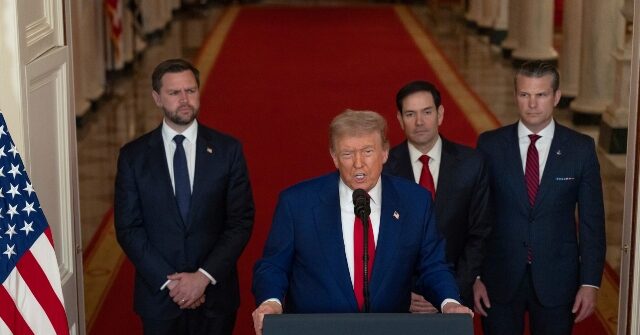The genocidal jihadist terror organization Hamas issued a statement late on Saturday condemning President Donald Trump for greenlighting a series of airstrikes on Iran’s largest uranium enrichment sites, calling it a “dangerous escalation.”
President Trump announced in a nationally televised address on Saturday that the U.S. military had executed airstrikes to destroy three nuclear sites in Iran: the Fordow, Isfahan, and Natanz facilities.
Trump has prioritized throughout his second term working to stop the Iranian regime from developing a nuclear weapon and preceded his decision to take military action with months of negotiations with Tehran, in which Iranian officials insisted they would under no circumstances accept limits on its enrichment of uranium.
Trump officials observed on several occasions that the volume of enrichment that Iran was undertaking was not compatible with any known civilian use of nuclear energy.
In its statement, Hamas implied that Washington was acting at the behest of the government of Israel, rather than independently, and insisted that Trump would be held “fully responsible” for any consequences.
“This brutal aggression constitutes a dangerous escalation and a blind adherence to the agenda of the rogue Zionist occupation,” Hamas declared, according to the Times of Israel.
“We affirm our solidarity with our brothers in the Islamic Republic… and our complete confidence in Iran’s ability to defend its sovereignty and the interests of its people,” the statement concluded.
Hamas is one of Iran’s most dangerous jihadist proxy terrorist organizations in the Middle East, acting as the government of the devastated Gaza Strip and enjoying close patronage from the Iranian regime for years. According to the State Department, Iran invests an estimated $100 million a year in supporting Hamas and other Palestinian terrorist organizations, such as Palestinian Islamic Jihad. Iran is believed to have been critical in supporting Hamas in the execution of its deadly massacres and widespread abductions during its siege of Israel on October 7, 2023.
Hamas’s comments echo a statement by the head of the United Nations, Secretary-General Antonio Guterres, who also referred to the strikes as a “dangerous escalation.”
“There is a growing risk that this conflict could rapidly get out of control – with catastrophic consequences for civilians, the region, and the world,” Guterres asserted, claiming, “there is no military solution.”
Citing Iran’s status as the world’s most formidable state sponsor of terrorism, President Trump said in a brief statement on Saturday that American airstrikes were necessary to end the threat of the Iranian regime obtaining a nuclear weapon.
“Tonight, I can report to the world that the strikes were a spectacular military success,” the president stated. “Iran’s key nuclear enrichment facilities have been completely and totally obliterated.”
“Iran, the bully of the Middle East, must now make peace,” Trump continued. “If they do not, future attacks will be far greater, and a lot easier,” Trump warned, noting that Iran regularly calls for “death to America” and has invested in terrorist organizations that have killed hundreds of Americans.
This action followed the Israeli government announcing a military operation on June 13 to eliminate the Iranian nuclear threat, which began with airstrikes targeting some of Iran’s highest-ranking military officials. The airstrikes notably eliminated the commander of the Islamic Revolutionary Guard Corps (IRGC), Iran’s in-house terrorist organization, Major General Hossein Salami, and several nuclear scientists.
The Israeli initiative has continued through the end of this week. On Saturday, reports surfaced that the Israeli Air Forces (IAF) eliminated the commander of the Palestine Corps of the IRGC Quds Force, Saeed Izadi, who played a key role in coordinating with Hamas.
Both the American and Israeli military actions followed the International Atomic Energy Agency (IAEA) passing a resolution finding Iran in violation of its nuclear obligations, based on a report by IAEA chief Rafael Grossi, who lamented that Iranian officials had prevented the United Nations agency from properly doing its work by keeping secret uranium enrichment facilities.

















